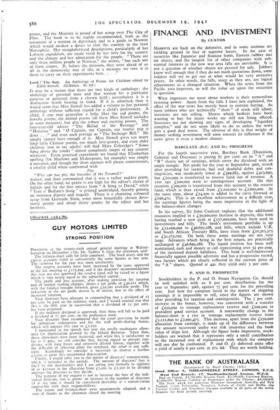FINANCE AND INVESTMENT
By CUSTOS
MARKETS are back on the defensive, and in some sections are yielding ground in face of superior forces. In the case of securities like Japanese and Siamese loans, Eastern rubber and tin shares, and the longish list of other companies with sub- stantial interests in the new war area falls are inevitable. It is not a question of whether shares are pressed for sale. Jobbers know well enough that if they do not mark quotations down, some holders will try to get out at what would be very attractive prices. In other words, the falls, steep as they are, are logical adjustments to a changed situation. When the news from the Pacific area improves, so will the value set upon the securities in question.
What impresses me most about markets is their tremendous resisting power. Apart from the falls I have just explained, the effect of the war news has merely been to restrain buying. As most jobbers who are technically " short " of stock will admit, investors are not selling. Shares which brokers have been wanting to buy for many weeks are still not being offered. Investors are not showing any signs of developing " liquidity complex," and do not seem likely to do so unless the news gets a good deal worse. The obverse of this is that weight of money seeking investment will soon reassert its influence if the news gives it even a modest chance.
BARCLAYS (D.C. AND 0.) PROGRESS For the fourth successive year, Barclays Bank (Dominion, Colonial and Overseas) is paying 61 per cent. on its " A " and " B " shares out of earnings, which cover the dividend with an ample margin. Net profit for the year to September 30th, struck after providing for taxation, bad and doubtful debts and con- tingencies, was moderately lower at £399,685, against £423,692, but £200,000 is transferred to reserve fund out of revenue. A year ago £200,000 went to contingencies account. On this occasion £3oo,000 is transferred from this account to the reserve fund, which is thus raised from k2,100,000 to £2,600,000. At the same time, about £24,500 is added to the carry forward at £596,470. This is an excellent achievement in a difficult year, the earnings figures being the more impressive in the light of the balance-sheet changes.
In his survey, Sir John Caulcutt explains that the additional resources implied in a £3o,000,000 increase in deposits, this item having reached a new peak at £157,00o,000, have been used in investments and bills. The bank's investment portfolio is up by £1 2,000,000 to £46,695,288, and bills, which include U.K. and South African Treasury Bills, have risen from £21,315,575 to £31,572,701. On both these items earnings are not very large. Advances which bring in the best return, are practically unchanged at £46,695,288. The liquid position has been well maintained, cash and money at call representing over 32 per cert. of the increased deposit liabilities. This bank is well-buttressed financially against possible adversity and has a progressive record, two factors which are clearly reflected in the current price of the " A " shares. Quoted at 44s. they yield only 3 per cent.
P. AND 0. PROSPECTS
Stockholders in the P. and 0. Steam Navigation Co. should be well satisfied with an 8 per cent. distribution for the year to September 30th, against 71 per cent. for the preceding year. Just how the company fared in the matter of shipping earnings it is impossible to tell, since the figures are showrl after providing for taxation and contingencies. The } per cent. increase in the bonus, however, was consistent with a transfer of £25o,000 to tonnage replacement reserve and £2oo,00o to provident good service account. A noteworthy change in the balance-sheet is a rise in tonnage replacement reserve from £t,m,600 to £2,991,475. This increase, apart from the £25o,00o allocation from earnings, is made up of the difference between the amount recovered under war risk insurance and the book value of ships lost. Although the figure looks impressive, stock- holders are warned that it represents only a small contribution to the increased cost of replacement with which the company will one day be confronted. P. and 0. Li deferred units offer a yield of nearly 6 per cent. at 27s. 6d. They are worth holding.






















 Previous page
Previous page